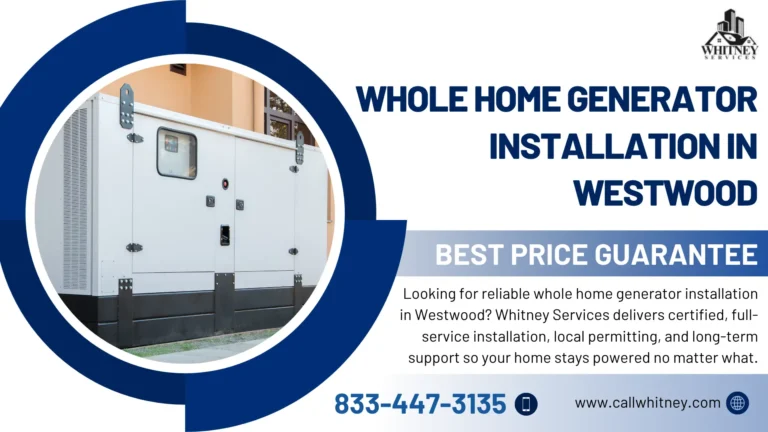Power outages are always inconvenient—but when they happen unexpectedly, they can feel downright stressful. Whether a severe storm, utility issue, or unexpected blackout, being without electricity disrupts daily life, food, comfort, and safety. Many homeowners in Westwood have come to realize that whole home generator installation in Westwood is more than a luxury—it’s a smart move.
This article is your guide. I’ll walk you through what a full home generator installation involves, typical costs, why you can’t just hand the job to any electrician, and how Whitney Services offers a seamless, worry-free solution. We’ll also cover key questions people often ask about generator systems.
By the end, you’ll feel confident evaluating proposals, comparing options, and choosing a team who truly understands your needs.
Why Invest in a Whole Home Generator?
Before digging into details, let’s talk about what a whole house generator really gives you and why so many Westwood homeowners are choosing to install one.
Seamless automatic power
A whole home standby generator detects when grid power fails and turns on automatically. You don’t have to plug anything in or run outdoors in dark weather.
Comprehensive coverage
Instead of just running a refrigerator or a few lights, a properly sized generator can power HVAC, lights, appliances, garage, security systems, even sump pumps.
Protect your home and valuables
When power fails, things like food spoilage, frozen pipes, security systems failing, or equipment surges can cause real damage. A generator minimizes those risks.
Long-term peace of mind
You won’t worry every time there’s a storm heading your way. You’ll sleep better knowing critical systems remain online.
Increased property value
Buyers appreciate homes already equipped for outage resilience. Generator installation becomes part of your home’s value.
Investing in generator installation in Westwood isn’t just about reacting to outages, it’s about staying proactive and in control.
What Is the Average Cost to Install a Whole House Generator?
This is one of the first questions every homeowner asks and with good reason. The answer isn’t one fixed number, but a range, because so many variables come into play.
Typical Cost Ranges
- For many homes, a complete turn-key installation, generator unit, wiring, transfer switch, labor, lands between $8,000 and $15,000+
- In simpler jobs or smaller load needs, some quotes may fall closer to $5,000 to $12,000
- More complex installations, difficult terrain, long wiring or fuel runs, added site work, can push costs to $18,000 or more
- Based on published industry data, some generator install costs (unit + install) span from $5,000 to $12,500 depending on size and site constraints
These ranges reflect the fact that no two installations are identical. Your home’s layout, electrical demand, fuel options, and permitting needs all shape the final number.
Cost Drivers to Watch Out For
Here are some of the biggest factors that can change your quote:
- Generator size / capacity: Bigger homes or heavier usage require more powerful units
- Fuel type & hookups: Natural gas, propane, or diesel fuel lines increase complexity
- Distance & wiring runs: Long cable runs, elevation changes, or obstacles add cost
- Site prep & foundation: Removing obstacles, leveling, concrete pads, drainage, landscaping
- Electrical panel upgrades: Your existing panel or switchgear might need upgrades
- Permit & inspection costs: Local jurisdictions charge fees and require inspection
- Access & labor difficult: Tight spaces, wall penetrations, or tricky routing slow down work
Because of these variables, any trustworthy contractor (like us at Whitney Services) offers a site visit and load analysis before giving a definitive quote.
How Much Does Generac Charge to Install a Generator?
Generac is one of the most recognized names in home standby generators. Though the installation cost is not fixed across all regions, general guidance and patterns emerge.
- Generac suggests that full installation packages (unit plus wiring, transfer switch, setup) often fall within the same $8,000–$16,000 ballpark
- However, they emphasize that final cost depends heavily on site complexity, fuel routing, wiring distance, and load demand
- The installation (labor, wiring, switches) portion alone often carries a significant cost—sometimes several thousand dollars—on top of the generator price
Because of this, many homeowners treat a Generac quote as a baseline, and then expect to adjust depending on the unique conditions of their home.
How Much Does a Generator Cost for a 2,000 sq ft House?
Using your home’s square footage as a guide helps, but the real determinant is how much electricity you use and what you want to power during outages.
For a typical 2,000 sq ft home:
- Many homes this size need a generator in the 12–24 kW range, depending on HVAC, appliances, and usage
- When properly sized, homeowners report total installations (generator + labor) in the $10,000 to $15,000+ range
- In more complex scenarios (e.g. long distances, tricky fuel lines, panel upgrades), costs may edge higher
What matters most is starting with a load analysis—not guessing by size alone. That ensures you don’t overpay for a generator too big or undersize and suffer capacity issues.
Can Any Electrician Install a Generac Generator?
Many electricians handle basic wiring and repair work—but installing a whole home generator is a specialty in its own right. Here’s why you should be picky about who you hire.
Key Qualities to Look For
- Generator expertise & certification: Brands like Generac often certify installers so they understand specific wiring, safety, and integration requirements
- Code & permit familiarity: Standby generator installations must meet electrical codes, fuel/gas line rules, grounding standards, bonding, and local regulations
- System integration experience: You must ensure proper transfer switch wiring, load handling, surge protection, and failover control logic
- Inspection & permitting track record: A contractor should know how to pull permits and pass inspections without rework or delays
- Local knowledge: Someone familiar with Westwood’s electrical utility patterns, inspection schedules, and common issues gives you smoother service
In short: a certified, experienced generator installer offers far more reliability and warranty confidence than a general electrical services professional attempting a complex job.
Is a Whole House Generator Worth the Money?
It’s a big investment—but many homeowners find the benefits outweigh the cost. Whether it’s “worth it” depends on how you value comfort, safety, and long-term resilience.
Reasons It’s Worth It
- Reliability when you need it most: No more guessing when power will return—you remain in control.
- Asset protection: From food spoilage to frozen pipes to equipment damage, you mitigate serious risks.
- Lifestyle continuity: Your HVAC, security systems, medical devices, and essential electronics stay powered.
- Reduced stress & convenience: You won’t scramble for portable generators or deal with extension cords and manual hookups.
- Resale appeal: Homes with well installed generator systems can command higher buyer interest.
- Insurance & incentive possibilities: Some insurers or local programs may offer benefits for homes with standby backup systems
When It Might Be Less Worthwhile
- If you rarely lose power or outages are always brief
- If your property conditions make installation unusually expensive
- If the cost outweighs your personal budget or priorities
For many, though, the confidence of uninterrupted power and minimized disruption justifies the investment.
Do I Need a Permit for a Generac Generator?
Yes, virtually always. And a great installer will manage that for you.
What Permits Typically Cover
- Electrical work (wiring, switchgear, grounding)
- Mechanical / fuel lines (propane lines, gas piping)
- Site setup / structural (foundation, pad, clearances)
- Safety & venting (exhaust clearances, fire codes)
Why You Don’t Want to Skip It
Unpermitted installations risk:
- Failing inspections or forced removal
- Voiding insurance coverage
- Complications when selling your home
- Safety or liability problems
At Whitney Services, we bundle permitting, inspections, and coordination with local authorities so you don’t have to worry.
Who Makes the Best Whole House Generator?
There’s no single “best” brand for everyone. What matters more is matching the unit to your home, local support, serviceability, and reputation.
Top Brands to Consider
- Generac is often the default for many homeowners due to product range and dealer network
- Kohler, Cummins, Briggs & Stratton and other brands also make solid standby generators
- The “best” generator is the one whose specs match your home, backed by responsive local support and service
When evaluating brands, prioritize:
- Warranty terms
- Part availability and local dealer reach
- Reputation for reliability and service
- Compatibility with your fuel type and site conditions
Why Choose Whitney Services
You deserve more than a contractor—you deserve a partner. Here’s why Whitney Services is a standout choice for whole home generator installation in Westwood:
- Trusted local experience: We know Westwood’s codes, inspection process, utility protocols, and site challenges.
- Certified, skilled technicians: Our electricians are trained in generator systems, transfer switches, fuel hookup, and diagnostics.
- Transparent, fair quoting: We don’t surprise you with hidden fees—what we quote is what you’ll see.
- Fully managed service: From load analysis and design to permitting, install, commissioning, inspection, and follow-up.
- Long-term support: Post-install, we provide maintenance, monitoring, repairs, and responsiveness.
- Customer-centered approach: We prioritize communication, clarity, cleanliness, and respect for your home.
We aim to make generator installation in Westwood feel like a smooth, transparent experience—not a headache.
What to Expect (Whitney Services Difference)
Here’s how we handle your generator project from start to finish:
1. Initial consultation & load study
We visit your home, understand your needs, list appliances and circuits, assess panel capacity, and evaluate probable loads.
2. System design & recommendation
Based on your usage and goals, we recommend generator size, fuel type, transfer switch type, and site layout.
3. Site planning & preparation
We determine optimal placement, ground pad or foundation, routing, clearances, and aesthetic integration.
4. Permit & approval process
We submit plans to the local building department, handle reviews, revisions, and scheduling.
5. Installation
Our team installs the generator, transfer switch, wiring, grounding, fuel lines or gas connections, sensors and interfaces.
6. Testing & commissioning
We run test events, simulate outages, balance loads, verify safety systems, and show you operations.
7. Electrical inspection & sign-off
We coordinate with inspectors to ensure everything complies and passes.
8. Ongoing maintenance & service
We offer annual service, runtime checks, battery replacement, filter changes, diagnostic checks, and emergency support.
During each step, we keep you informed so there are no surprises.
Conclusion
When it comes to protecting your home and family, few investments offer the peace of mind that a whole home generator installation in Westwood provides. Power outages can strike anytime, and while you can’t control the weather or the grid, you can control how prepared your home is.
Choosing the right team makes all the difference. At Whitney Services, we’re not just electricians, we’re your neighbors, committed to keeping Westwood homes safe and powered year-round.
If you’ve been thinking about adding a standby generator, now’s the perfect time to act. Let Whitney Services walk you through your options, give you a clear, no-pressure quote, and show you firsthand why local homeowners trust us for dependable electrical services in Westwood.
Frequently Asked Questions
We typically build in some headroom during design. If you expand significantly (new HVAC or workshop, for example), we can upgrade components like the transfer switch or generator later.
Once per year or every 100 run hours (whichever comes first) is standard. Service includes oil/fuel filter changes, spark plug or injector check, battery inspection, control diagnostics, and system tests.
Modern units are much quieter than older ones. Many run around 60–70 decibels—or about the sound level of a normal conversation, depending on enclosure, insulation, distance, and landscaping.
Common options include natural gas, propane, and diesel. Each comes with trade-offs in cost, infrastructure, fuel storage, reliability, and maintenance. We’ll help you choose what’s best for your site.
Yes. The system includes an automatic transfer switch (ATS) that senses power loss, starts the generator, transfers load, and then switches back once grid power returns—all without manual intervention.







